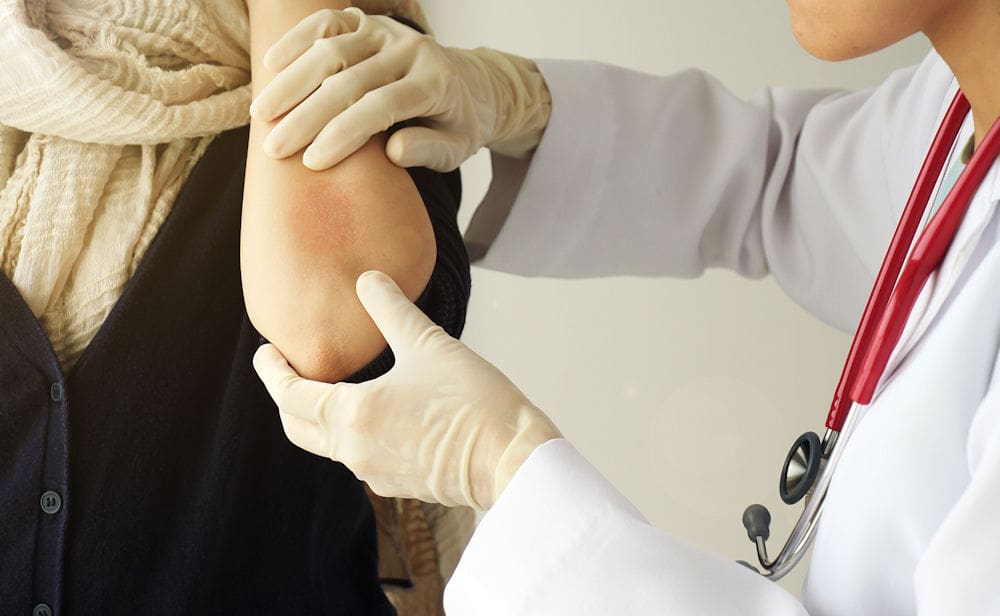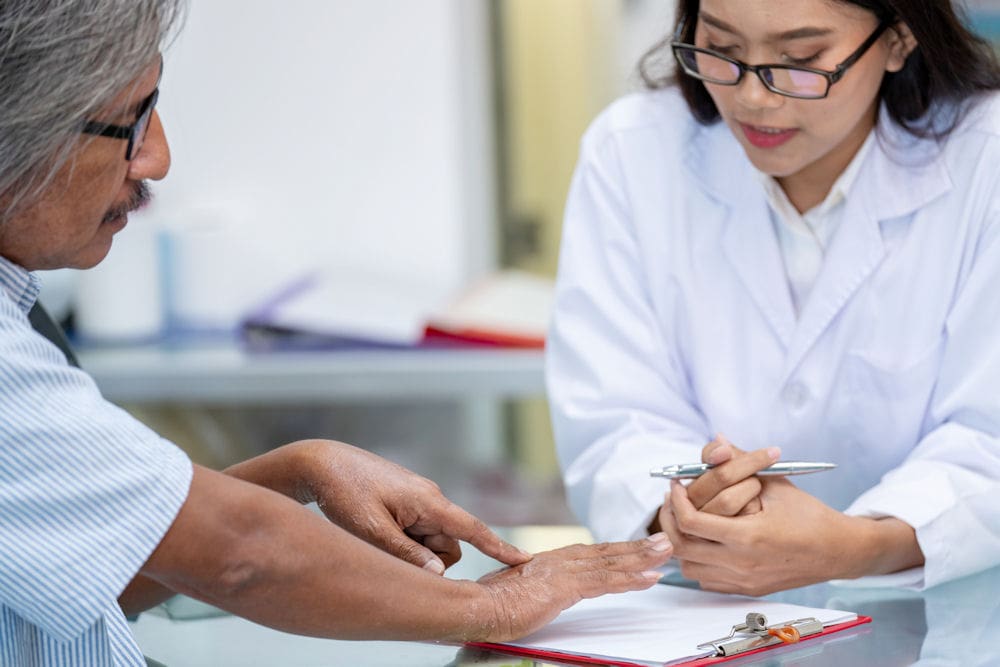Ever wonder why your skin looks dull and flaky the morning after a night of heavy drinking? Alcohol wreaks havoc on your skin in more ways than one. You may notice puffiness, redness, or broken capillaries on your face, but the damage goes deeper than that. Alcohol dehydrates your skin, depletes it of nutrients, and causes inflammation in your body. The toxins in alcohol also break down collagen and elastin, the proteins that keep your skin firm and elastic. Over time, these effects accumulate and age your skin prematurely. The good news is that your skin can bounce back if you cut back or quit drinking.
The Freedom Center offers treatment and support groups to help combat addiction and the resulting skin problems from alcohol abuse. Read on to learn exactly how alcohol damages your skin, the types of alcohol that are worse for your skin, and how you can reverse the effects by improving your skincare routine and lifestyle.
What Effect Does Alcohol Have on Your Skin Indirectly?
Excessive alcohol use can have a range of detrimental effects on the body that can contribute to skin problems. Here are some of them:
Dehydration
Alcohol acts as a diuretic, causing increased urine production and potentially dehydrating the body, including the skin. This dehydration can contribute to various skin issues and can make the skin appear dull, dry, and less plump, potentially accentuating the appearance of fine lines and wrinkles.
Nutritional deficiencies
Excessive alcohol consumption can disrupt the body’s ability to absorb and utilize certain essential nutrients, such as vitamins A, C, E, and B complex vitamins. These vitamins and minerals are essential for maintaining healthy skin. Deficiencies in these nutrients can lead to skin problems like dryness, inflammation, and a weakened skin barrier.
Hormonal imbalances
Alcohol can interfere with hormone regulation in the body. This disruption may affect the production and balance of hormones such as cortisol and estrogen, which can influence skin health. Hormonal imbalances can contribute to acne breakouts, oily skin, and other skin-related issues.
Liver function
The liver plays a crucial role in detoxifying the body, including the breakdown and elimination of alcohol. Excessive alcohol consumption can place a significant burden on the liver, impairing its ability to function properly. When the liver is compromised, it may not efficiently remove toxins from the body, leading to an accumulation of waste products that can indirectly affect the skin.
Inflammation
Alcohol consumption triggers an inflammatory response in the body. Chronic or excessive alcohol intake can lead to systemic inflammation, which has been linked to various skin conditions, including psoriasis, eczema, and rosacea. Inflammation can exacerbate existing skin issues and contribute to their development.
Sleep disruption
Alcohol can disrupt normal sleep patterns and the quality of sleep. Inadequate sleep has been associated with skin problems such as dullness, dark circles under the eyes, and increased susceptibility to skin infections.
It’s worth noting that individual responses to alcohol can vary, and some people may be more susceptible to these indirect effects than others. If you have specific concerns about your skin, it’s always advisable to consult with a dermatologist for personalized advice and treatment.
What Effect Does Alcohol Have on Your Skin Directly?
Alcoholism and Psoriasis
Alcoholism and psoriasis have been found to have a significant relationship. Psoriasis is a chronic autoimmune skin condition characterized by red, inflamed patches of skin covered with silvery scales. While the exact cause of psoriasis is not fully understood, it is believed to involve genetic factors, immune system dysfunction, and environmental triggers.
If you have psoriasis, you may have noticed that drinking alcohol causes flare-ups or makes your symptoms worse. There are a few reasons why alcohol aggravates psoriasis:
- Alcohol dilates blood vessels in the skin, increasing inflammation and irritation. This can trigger the rapid production of new skin cells that build up and form psoriatic plaques.
- Alcohol impacts the immune system, causing it to release inflammatory chemicals that worsen psoriasis symptoms like redness, swelling, and itching.
- Alcohol may interfere with the effectiveness of some psoriasis medications by inhibiting their absorption or speeding up their breakdown in the liver.
The more you drink, the worse your psoriasis may become. Binge drinking or chronic heavy alcohol use is particularly damaging. If you have severe psoriasis, it’s best to avoid or limit alcohol consumption as much as possible to help keep your symptoms under control.
Alcoholism and Acne
Alcoholism can potentially contribute to the development or worsening of acne. While acne is primarily caused by factors such as excess oil production, clogged pores, and bacterial overgrowth, alcohol consumption can indirectly affect these factors and exacerbate acne symptoms. Here’s how alcoholism can impact acne:
- Alcohol dehydrates the skin, which can stimulate acne formation. Staying properly hydrated is key to clear skin.
- Alcohol disrupts sleep, and lack of sleep is linked to acne flare-ups. Aim for 7 to 8 hours of sleep per night to allow your skin to rebalance and heal.
- Heavy alcohol use can lead to poor diet and nutrition. A balanced diet with plenty of water, fruits, and vegetables will give your skin the nutrients it needs to prevent breakouts.
The occasional drink may not directly cause acne, but excessive or binge drinking certainly won’t do your skin any favors. For the best complexion, limit alcohol consumption and maintain a healthy lifestyle with good skincare habits. Your skin will thank you!
What are the Effects of Different Types of Alcohol on Your Skin?
Wine
Drinking too much wine can lead to skin conditions like rosacea, acne, and psoriasis flare-ups. The sulfites in wine are common triggers for rosacea and acne. Red wine in particular contains tannins that can cause histamine reactions like rashes, hives, and itchiness. Limit your wine intake to 1 glass per day and choose low-sulfite options when possible.
Beer
Beer is full of yeast and gluten, both of which can irritate the skin and cause conditions like eczema, psoriasis, and dermatitis. The hops in beer may also trigger skin inflammation and rashes. If you have gluten sensitivity, beer can directly damage the intestinal lining and cause a “leaky gut,” allowing toxins and pathogens to enter the bloodstream and lead to skin problems. Limit your beer consumption and choose gluten-free options if needed.
Spirits
Hard alcohols like whiskey, vodka, and rum are highly dehydrating and damaging to the skin. They strip moisture, increase free radical damage, and break down collagen in the skin. This can accelerate aging, causing dryness, dullness, wrinkles, and skin conditions like psoriasis or eczema. Limit spirits to 1 ounce a few times per week, and be sure to drink plenty of water to counteract their dehydrating effects.
Sugary Mixers
The sugary mixers used in many cocktails, especially when consumed in excess, can wreak havoc on your skin. Sugar causes inflammation in the body that can lead to acne, eczema, wrinkles, and skin aging. It also feeds the bad bacteria in your gut microbiome and can lead to a leaky gut, which further exacerbates skin problems. Choose low- or no-sugar mixers, add extra water to your drink, limit cocktails to one per week, or avoid them altogether. Your skin will thank you!
In summary, while moderate alcohol consumption may have some benefits, frequent or excessive drinking of any kind can damage your skin’s health and appearance over time. Be mindful of how much and what you’re drinking to avoid or improve common skin conditions and slow the aging process. Moderation and self-care are key.
What to Expect When You Quit Drinking

Clearer, Brighter Skin
Within a month of quitting drinking, you’ll start to notice your skin looking clearer and brighter. Alcohol dehydrates the skin and body, dilates blood vessels, and inhibits vitamin absorption—all of which can lead to a dull, unhealthy complexion. Without the dehydrating effects of alcohol, your skin will become properly hydrated again, and the underlying blood vessels will return to their normal size, reducing any redness.
Fewer Breakouts
Alcohol disrupts hormone levels in the body, which can stimulate oil production and clog pores, leading to acne breakouts. By eliminating alcohol, your hormone levels will stabilize and oil production will normalize, resulting in fewer pimples and blackheads. For some people, completely quitting alcohol may be necessary to clear up persistent adult acne.
Reduced Puffiness
Excessive alcohol causes inflammation in the body, which can lead to a swollen, puffy face. Quitting drinking will decrease inflammation and fluid retention, resulting in a slimmer, less bloated appearance, especially on the face. Your cheeks and jawline will appear more defined again.
Improved Skin Health
Without the damaging effects of alcohol, your skin will start to repair itself from the inside. Collagen and elastin production will increase again, leading to skin that is firmer, smoother, and more youthful. Skin conditions like rosacea may begin to clear up. Your skin will also become better hydrated, as alcohol severely dehydrates the skin and body. Moisturizing daily and drinking plenty of water will enhance these rejuvenating effects.
Quitting alcohol can transform your skin and reverse signs of premature aging. Be patient through the process and continue to nourish your body and skin. The results will be well worth it! Within a few months of sobriety, you’ll see wrinkles start to fade, breakouts clear up, and an overall healthy glow return.
Treatment Options for Alcohol Addiction and Related Skin Conditions

Detox and Rehab
The first step in treating alcohol addiction and related skin conditions is to stop drinking. This is done through detoxification (detox) and rehabilitation (rehab). Detox helps you safely withdraw from alcohol, while rehab provides the psychological support and life skills needed for long-term sobriety.
Medical Treatment
Once you’ve gone through detox and rehab, a dermatologist can treat any skin conditions caused by or worsened by alcohol use. Options include:
- Prescription creams for rashes, acne, or psoriasis. Topical corticosteroids can reduce inflammation, while retinoids boost cell turnover.
- Antibiotics for infections, isotretinoin for severe acne, and immunosuppressants for psoriasis are examples of oral medications.
- Light therapy uses UVB rays to slow down the rapid growth of skin cells.
- Minor procedures like dermabrasion to smooth the skin or steroid injections to shrink cysts.
Lifestyle Changes
Making healthy lifestyle changes can help your skin heal and support your recovery.
- Drink plenty of water to keep your skin hydrated and promote detoxification.
- Get enough sleep so your skin has time to rejuvenate overnight. Adults typically require 7-9 hours of sleep per night.
- Eat a balanced diet with lots of fruits and vegetables, lean proteins, and healthy fats. Limit sugar, salt, and processed foods.
- Exercise regularly to increase blood flow to your skin and release feel-good hormones that combat stress and cravings.
- Develop new hobbies and social connections that don’t involve alcohol. Staying busy and connected to a support network is key.
Follow-up Care
Overcoming alcohol addiction and related health issues is an ongoing process. Follow-up care with a doctor, therapist, support group, or recovery program can help you stay committed to your sobriety and make continued progress in healing both physically and emotionally. Staying committed to your recovery will have huge benefits for both your health and appearance.
Break the Cycle of Addiction at The Freedom Center
At The Freedom Center, we are dedicated to helping individuals break free from the cycle of addiction and reclaim their lives. Our comprehensive approach combines evidence-based therapies, compassionate support, and a nurturing environment to foster lasting recovery. We understand that addiction is a complex disease that affects every aspect of a person’s life, which is why we provide personalized treatment plans tailored to each individual’s unique needs. Reach out to us now!











































